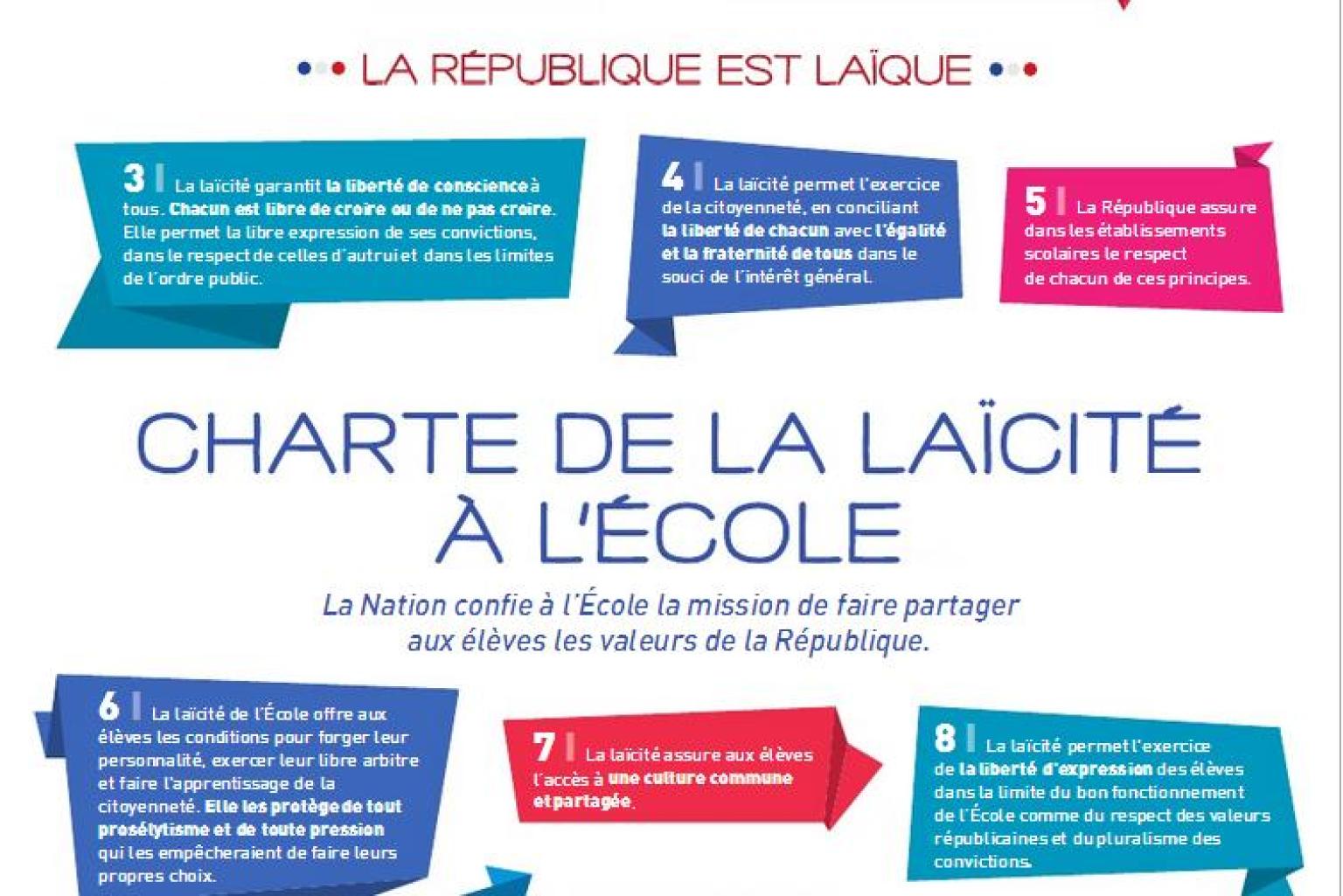SCHOOL IN FRANCE
The “Charte de la laicité à l’école” was submitted to parents for signature. The opinion of Berruer (Catholic) and Kbibech (Muslim)

Fifteen points to say that the French Republic is “secular, democratic and social”, founded on the “separation between religions and the State”. “Everyone is free to believe and not to believe”, teachers are called to maintain utmost “neutrality” in their political or religious beliefs. The display of symbols representing religious belief is forbidden in public schools and nobody may violate the school’s regulations on the basis of their religious or political beliefs”. The quote is from the “Charte de la laicité à l’école”: affixed across all public schools of France in 2013. Appeal to sign. This year – probably as a result of the terror attacks in January, which deeply shocked French society the document was submitted to the parents of 12 million students at the beginning of the school year, inviting them to sign it. It is not mandatory and there are no sanctions. The invitation to sign the document said an officer at the ministry for education, of Moroccan origin, Najat Vallaud-Belkacem – is a way to empower parents in the educational project and to encourage “co-education” because “it is easier to transmit values to students if teachers and parents say the same things”. Engines are running in full speed in France this year too, where for the first time will be celebrated the Laicity Day, on the same date when, 110 years ago, was adopted the law stipulating Church-State separation. Catholic schools. Claude Berruer is the deputy Secretary General for “enseignement catholique”: a reality that in France counts 4,800 primary schools, 1,600 collèges, 2,350 high schools with a total of over 2 million students. The Charte he hastened to explain – is not imposed upon those Catholic schools that did not post it up two years ago and did not have it signed by parents this year. Berruer pointed out that the drafting of the text “is prior to the attacks in January,” so its content was not affected. The document represents “the definition of French laity in the framework of the 1905 law according to which also public schools are a secular place where religious expression is not possible. Also teachers who are State officers are bound to total neutrality. Thus it is a call to what has been enshrined within French legislation for many years”. The Secretary General recalled that in the course of the centuries the history of France was marked by strong religious tensions; veritable religious wars, even conflicts between the Church and the State, leading feelings of opposition to take roots within the French mentality. “This prompted the creation of a secular State aimed at concealing religious expressions. Catholic schools and the Church – believe that laicity should be a space for encounter, dialogue, and expression of various identities”. But if in Catholic schools the Document has not been signed and therefore teachers and not compelled to adopt a neutral position, it doesn’t mean they are exempted from following national school programs on moral and civic education on the “liberté, egalité et fraternité” values of the French Republic. “However, this is done according to our own peculiarities – Berruer pointed out -. That is, on the basis of our belief that laicity, as underlined by John Paul II, is part and parcel of the social doctrine of the Church understood as the separation of the State and of the Church, of non-interference, which does not deny the presence of religion in society. Catholic schools are public places where religious expression is perfectly possible. Thus by allowing the expression of the specific ethnic, cultural and religious traits, schools become places to build fraternal and peaceful relations. Many Muslims choose our schools and this is proof that coexistence can develop, even within the respect for the expression of specific identities”. Educational value. In 2013, the rector of the Great Mosque in Paris, Dalil Boubaker, reacted very strongly against the appeal to affix the Charter of laicity in schools, describing it as an initiative directed against the Muslim community in particular. However, Anour Kbibech, neo-president of the French Council for Muslim faith, has a different opinion. He said that this year’s invitation to pupils’ parents to sign the Charter is a way to “raise the awareness of pupils and parents on a set of regulations adopted at national level by the secular State of the French Republic”. Kbibech recalled that immediately after the terror attacks in Paris a certain number of students refused to respect a minute of silence for the victims. This episode “highlighted the need to undertake an educational program. So this initiative is not the result of fear, but rather the acknowledgement that pedagogical work needs to be carried out with the students and with their parents”. What is laicity? “Laicity replied the leader of the Muslim community has never been the denial of religions. Conversely, it guarantees the possibility of freedom of expression and worship. Whether Muslim, Jewish, Christian or non-believer laicity guarantees the rights of those who want to practice their own religion with dignity and in peace”.